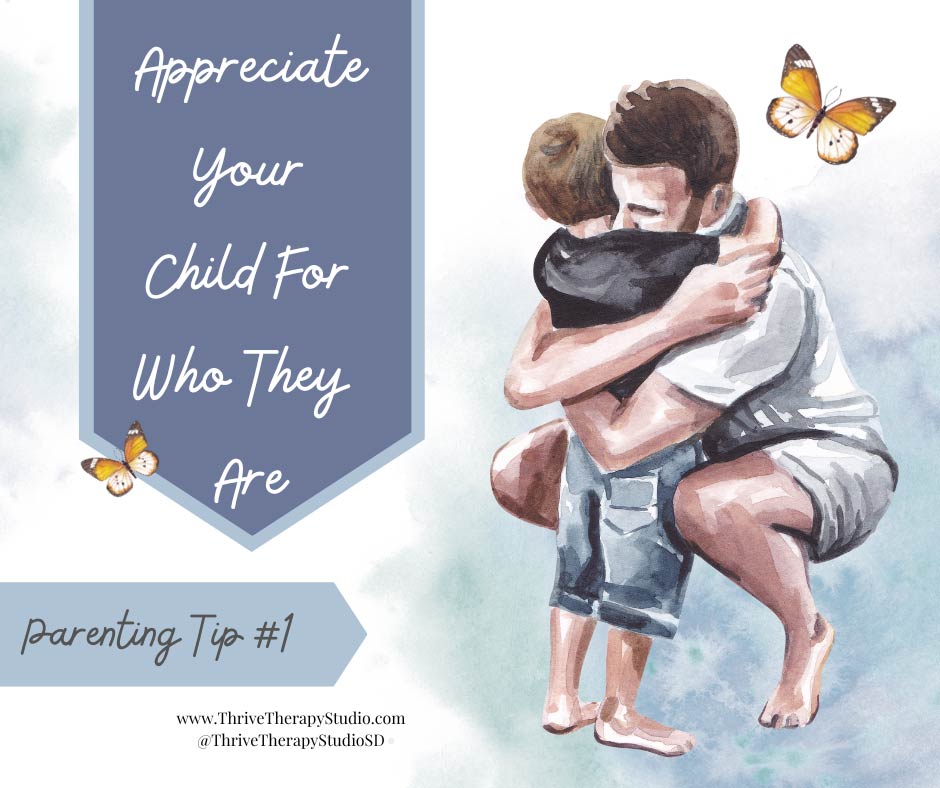While this one may seem obvious, I can’t tell you how often parents have come into my office to share that they would like their child to be different in some way. Less bossy, less active, more active, more studious, more social, less shy, more optimistic, and the list could go on and on and on! This uneasiness is especially true for families where the child’s mental health is a concern or if they are struggling at school or socially.
While this is truly understandable, especially as most parents believe they can mold their child in an image they create (more on this later), it is not entirely helpful for children’s development. You see, when parents want to change their child and their personality, the child inherently will get a message that they are somehow “not right.”
While parents can do their best to approach their kids from an angle that their “behavior” is the problem and what needs to be corrected, unfortunately, kids often still hear that it is them, who they are, that is a problem. While I wholeheartedly support the idea of separating behavior from a person, that is a complicated concept for many kids. As a child and teen therapist, I hear this from my young clients that while they seem to understand what their parents are trying to do, it still feels like they are failing. Not in their choices or behavior but in who they are as a person.
This feeling of something being inherently wrong with you is what I believe often leads to shame, depression, and anxiety. It can also lead to more significant issues such as self-injury, suicidality, and substance use. Regardless of the specific outcome, it definitely creates way more problems than the original behavior or personality trait might have created. While this is never a parent’s intention, focusing on shifting your perception of your child and their traits or behavior. All of our personality traits have pros and cons. As a parent, it can really help to focus on the positive side of the traits or challenges your child is experiencing.
Here are some examples of how to do this:
- If they are more shy, wonderful! This means they are cautious and likely to avoid more impulsive friendships and choices. Definitely not a bad thing in adolescence. Embrace their shy demeanor and let them pace social interactions.
- Let’s say your child is impulsive, great! This means that they will take risks and actions in their life. Also, not an inherently bad thing! Keep them involved in activities that can use their spirited nature for something helpful, such as sports.
- Perhaps your child is strong-willed, ideal, really! This means that they will persevere and push for things that they want. While not easy to parent, definitely a great trait in adulthood! Try to remember that while we all would love compliant children 100% of the time, just to make parenting easier, most of us also want children who are independent thinkers, and that is what a strong-willed child is beyond everything else. Give them choices when you can and embrace their spirited nature even when they are upset with you for a boundary you have set.
While it is certainly challenging to parent children who may remind us of a difficult family member or whose personalities are difficult for us to understand, it is significantly easier if you consider the gifts of their personalities or traits. It just takes time and practice to consider these things and then remember them in the moment. Try taking time each day to reflect on the challenges you are having with your child and consider the “flip side.”
In this discussion, I feel the need to bring up the idea of “shaping” our children into who we want them to be. The absolute most important thing we can do as a parent is to foster our kids’ development into who they want to become and to encourage their interests. Not for us or because of us, but led by them. Even kids who seem more malleable in childhood will struggle in adulthood if they are not allowed to develop a sense of who they are and where they want to go in life. This phase of development is an inherent part of kids becoming independent adults who have passions and interests to pursue. Especially in this modern parenting age, when the pressure put on kids to perform and achieve is so high, it is crucial that they have an internal compass to help them find their own path. This navigational tool will help ensure they are not just “checking the boxes” that are being asked of them, but making choices they want and enjoy.
For example, if it is important to you that your child play a sport, great! But try to expose them to a few and let them choose rather than pushing them to play a sport you like(d). Remember, we can always, and need to, set boundaries with our kids, but we need to allow them the freedom to choose their path within our limits.
We also need to remember that, ultimately, who they become is not up to us but to them. This applies to all things – their personality, interests, careers, relationships, sexuality, gender identity, etc. You have the privilege of watching them bloom into who they are meant to be. Try to embrace the unknown of this and your child’s unique gifts!
Read on next week for Parenting Tip #2 – All about Quality Time!
Reach out to start
your healing journey


